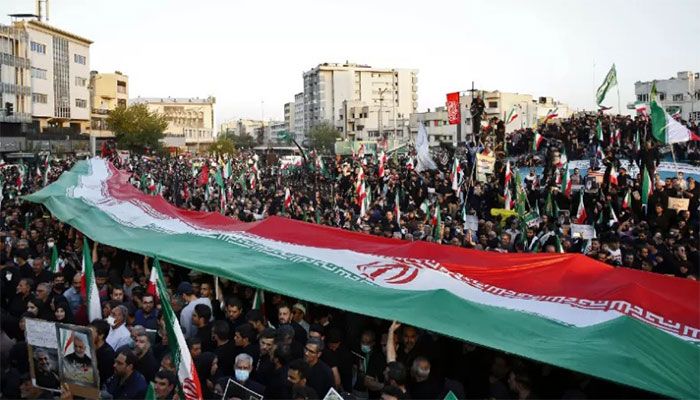
Iran Executes More Than 50 People So Far This Year
Desk Report
Published: 28 Jan 2023, 04:23 pm

Iranian pro-government protesters wave their national flag during a rally against the recent anti-government protests in Iran, in Tehran, on September 25, 2022 || AFP Photo
Iranian authorities have executed 55 people in 2023, Norway-based Iran Human Rights (IHR) said Friday, adding that the surging use of the death penalty aims to create fear as protests shake the country.
Meanwhile, rights group Amnesty International said three young people sentenced to death over protests -- the youngest aged just 18 -- had been subjected to "gruesome torture" in detention, reports AFP.
IHR said it has confirmed at least 55 executions in the first 26 days of this year.
Four people have been executed on charges related to the protests, while the majority of those hanged -- 37 convicts -- were executed for drug-related offences, IHR said.
At least 107 people are still at risk of execution over the demonstrations after being sentenced to death or charged with capital crimes, the group added.
With Iran's use of the death penalty surging in recent years, IHR argued that "every execution by the Islamic Republic is political" as the main purpose "is to create societal fear and terror".
"To stop the state execution machine, no execution should be tolerated, whether they be political or non-political," said IHR director Mahmood Amiry-Moghaddam.
He added that a lack of reaction from the international community risked lowering "the political cost of executing protesters".
'State-sanctioned killing'
Activists have accused Iran of using the death penalty as an instrument of intimidation to quell the protests which erupted in September following the death of the Mahsa Amini, 22, who had been arrested for allegedly violating the country's dress code for women.
UN rights chief Volker Turk has said Iran's "weaponisation of criminal procedures" to punish demonstrators "amounts to state-sanctioned killing".
On Friday, Amnesty said three men sentenced to death in December had been subjected to torture "including floggings, electric shocks, being hung upside down and death threats at gunpoint".
They were convicted of inciting arson and vandalism during protests in September in Mazandaran province in Iran's north, Amnesty said in a statement.
Javad Rouhi, 31, suffered torture that included being "sexually assaulted by having ice put on his testicles", Amnesty said.
Mehdi Mohammadifard, 19, was kept for one week in solitary confinement in a mice-infested cell and was raped, leading to "anal injuries and rectal bleeding, which required hospitalisation", it said.
Arshia Takdastan, 18, "was subjected to beatings and death threats, including having a gun pointed at his head if he did not 'confess' in front of a video camera".
Surging executions
IHR and other rights groups have yet to publish figures on executions in Iran for 2022.
But IHR said in early December that more than 500 people had been hanged by then -- the highest figure in five years -- while according to its data, at least 333 people were executed in 2021, a 25 per cent increase compared to 267 in 2020.
As well as arresting thousands of people, Iranian security forces have also used what campaigners describe as lethal force to crack down on the protests.
IHR said that according to its latest count, security forces have killed at least 488 people, including 64 aged under 18, in the nationwide protests.
Of the 64 children, 10 were girls, it added.
Mohsen Shekari, 23, was executed in Tehran on December 8 for wounding a member of the security forces, while Majidreza Rahnavard, also 23, was hanged in public in Mashhad on December 12 on charges of killing two members of the security forces with a knife.
On January 7, Iran executed Mohammad Mehdi Karami and Seyed Mohammad Hosseini for killing a paramilitary force member in November.
In another high-profile execution, Iran said on January 14 that it had executed British-Iranian dual national Alireza Akbari after he was sentenced to death on charges of spying for Britain. He had been arrested more than two years earlier.
Analysts say demonstrations have subsided since November, but the protest movement still remains a challenge to the Islamic republic under Ayatollah Ali Khamenei.